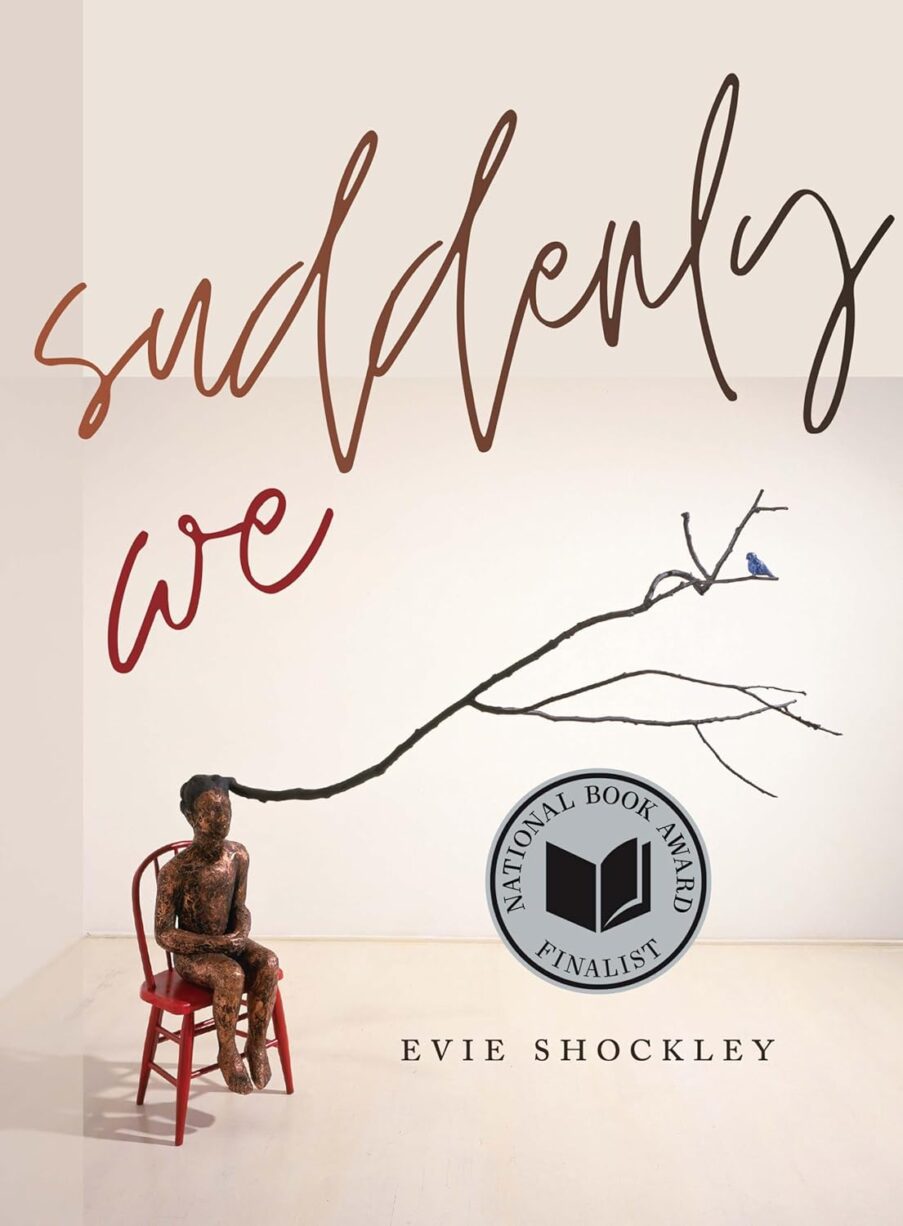
A Review of Evie Shockley’s suddenly we
November 15, 2024 | blog, book reviews, news

Review by Tanner Crunelle, MFA ’24
suddenly we
112 pp. Wesleyan University Press. $15.95
Evie Shockley’s latest collection of poetry, suddenly we, contains the songs of a poet whose heart is so capacious it’s almost from another planet. We sail with Shockley into an Afrofuturist horizon, equipped with Toni Morrison’s proverb: “I refuse the prison of ‘I’ and choose the open spaces of ‘we’.”
The serial proem begins the collection’s work to reconstitute political community. Its title, “alma’s arkestral vision (or, farther out),” fuses “orchestra” with “ark,” which refers to Black religious narratives of exodus while also reappropriating the ship as the transatlantic carrier of enslaved persons. The title visually echoes “astral,” in reference to Sun Ra’s far-out jazz “Arkestra” and Alma Thomas’s painted cosmic visions. Remixing these dual lineages of the musical and visual, the collection catapults us to the endless final frontier of Black aesthetics.
These themes converge in the sequence’s first moment: a calligram in the shape of “we.” It’s made of “you” 43 times and “me” once. Shockley immediately shows that the me reading (and writing!) the poem is part of this grand we. And yet, you belong in these poems; you belong; you matter to something larger than yourself. So do I. This “ark” does not sink into simple individualism. We move forward (or outward) across the collection—into another reality.

After the proem, the collection’s first standalone poem, “perched,” is ekphrastic. (It’s dedicated to the contemporary sculptor Alison Saar, whose work “Blue Bird,” graces the book’s cover). In this poem, Shockley draws an analogy between the figure of the poet and the figure of the bird, that emblem of freedom across the history of lyric poetry. The speaker warbles in first person: “i am black, comely, / a girl.” Recalling Lucille Clifton’s style, the speaker goes on to insist there is an otherworldly beauty here on earth, belting “my song, an aria.”
This song carries across the collection, in harmony with the history of Black feminist struggle. She pays homage to Black sisters, mothers, grandmothers, and brothers who dreamed before her: 22 different figures of Black literary history appear in dedications or epigraphs. Those lost to state violence, such as Breonna Taylor, appear alongside leaders in the struggle for Black liberation.
The choral nature of the collection does not obscure the poet’s impressive formal range. Poems often renovate established forms—the sonnet, the couplet, the prose poem—and craft new forms along the way. This move mirrors how the poet’s self-effacement takes with her own singularity. The we with a history, like the “I” of poetry, cannot shirk from repairing this world. More specifically, Shockley does not leave behind the U.S. or Global Souths. The next-to-last poem of the collection is “facing south.” Also dedicated to Alison Saar, it has two epigraphs. The first is Malcom X’s famous dictum turned all lowercase: “as long as you are south of the canadian border, you are south.” Then, Shockley quotes her own remix of this: “now, even the north pole is south.” With this context, in the first two lines we see reference to Frantz Fanon’s famous study of the psychic life of oppressed persons, The Wretched of the Earth, along with an African American hymn, “Swing Low, Sweet Chariot.” In the second stanza, the “harriet-chariot” voyages from Harlem to Angola Prison, from Compton to the maquiladoras. The geographic breadth is astonishing. A potent final gesture, “facing south” affirms the critical energy of radical Black poetry, moving us into solidarity with a plurality of others.
Shockley’s suddenly we leaves out no place, no life, no body. Is there a more hospitable space in politically conscious, formally challenging poetry today?
